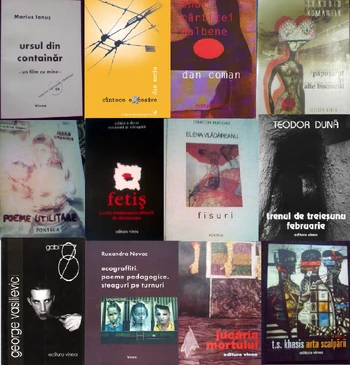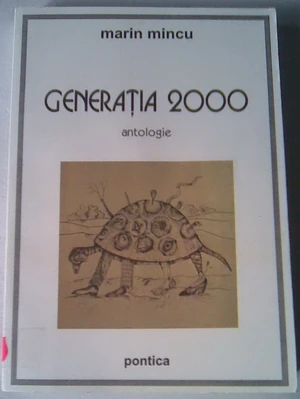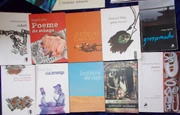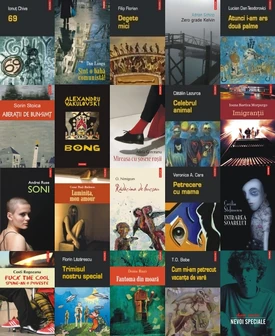
Several poetry books of the early 2000s (by Marius Ianuș, Dan Sociu, Dan Coman, Claudiu Komartin, A. Urmanov, Răzvan Țupa, Elena Vlădăreanu, Teodor Dună, George Vasilievici, Ruxandra Novac, Const. Acosmei, T.S. Khasis)
The 2000's generation (also known as the MM generation or millenarism; in Romanian: generația 2000, generația MM, milenarism) is the latest generation of Romanian literature and is associated with a number of writers who were born and raised in the last decades of the Communism regime and in the first years of democracy. The term was first used by Marin Mincu and Nicolae Tzone, two of the first editors and promoters of these young writers.
A list of themes and motifs may include: sex, death, daily life, alienation, the pitfalls of the mass-media and consumerism etc. They are often described as nonconformist, brutal, uncensored "punks" with appetite for apocalyptic nihilism and craving for authenticity away from conventions and compromises. However, beyond these stereotypes there are dozens of shades and, actually, enough varieties of styles and attitudes that their identity as a generation was often doubted. Marin Mincu and Ștefania Mincu did managed though to impose certain boundaries, but Octavian Soviany has already attempted to modify the image to that of a "proteic generation" unified by the fundamental impulsiveness of its members, but integrating almost contradictory poetic directions. Influences include the avant-garde (Geo Bogza, Gellu Naum), Mircea Ivănescu, Emil Brumaru, Mircea Cărtărescu, Ion Mureșan, Romulus Bucur, Cristian Popescu, Daniel Bănulescu, Ioan Es. Pop (Petru M. Haș and the poets from Vînt potrivit pînă la tare are among the lesser-known poets invoked more recently as predecessors).
Currently, there is no consensus on the (supposed) structure of the generation, as the chronological boundaries are still unclear (some claim the generation is far from being done with, while others, such as Răzvan Țupa, declared it "dead" as early as the mid-to-late 2000's) and, until now, the phenomenon was analysed by few critics (other than the Mincu husbands, the first to release books about the 2000's generation). There has been little discussion on the number of "waves" in which the generation could be split (it was said about the 2008 anthology Nasturi în lanuri de porumb that it represents the "third wave"). Stylistic classification is slightly less disputed: some terms were created by poets via manifestos (fracturism - Marius Ianuș and Dumitru Crudu -, utilitarism - Adrian Urmanov, deprimism - Gelu Vlașin), others were circulated by critics (miserabilism - Marius Ianuș, Ruxandra Novac, Elena Vlădăreanu, Domnica Drumea -, neo/post-expressionism - Dan Coman, Teodor Dună, Claudiu Komartin, Cosmin Perța -, minimalism - Adrian Urmanov, Denisa Mirena Pișcu -, visceral poetry - Elena Vlădăreanu, Miruna Vlada, Oana Cătălina Ninu -, biographism - Dan Sociu -, maximalism etc.). However, these are all very arguable terms that sometimes overlap significantly - a result of the attempts of writers to "escape the box". Andrei Terian has, so far, provided the most simplified classification: poetry of "daily life mimetism" (Ianuș, Sociu) and poetry of "everynight vision" (Coman, Komartin, Dună). However, drawing boundaries is still a quicksand (for instance, the use of "neo/post-expressionism" seems to be currently supplanted by the term "visionary poetry", while other terms, such as minimalism, remain rather loose).

Generația 2000 (anthology by Marin Mincu, front cover by Aurel Gheorghiu-Cogealac, 2004)
It is interesting to note that the term was brought up in a text by Marin Mincu in 2003 (although anticipated as early as 1998, in the anthology Poezia română actuală), after Adrian Urmanov and several others had extremely negative response (during an edition of Euridice) in front of the texts of Florin Iaru (and, previously, other major poets of the 1980's generation such as Traian T. Coșovei or Gheorghe Iova). As a consequence, the 2000's generation was and still is often defined as rejecting the "obsolete games" of textualism and postmodernism of the 1980's generation, even though several of the earliest writers (such as Ianuș) were members of Mircea Cărtărescu's literary circle and even though intertextuality persists even in some texts of Ianuș, for instance. However, it is true that the textualist excesses were significantly toned down and that 2000ists pushed forward Cristian Popescu's principles and seeked more authenticity and realism, as free as possible of postmodern irony and elitist sarcasm. The next few "waves" of poets such as Radu Vancu, Dumitru Bădița, V. Leac and other poets that have been/would have been considered "ex-centric" in Marin Mincu's vision tend to propose a more ecletic and open perspective.

A few recent poetry books
Marius Ianuș, Dan Sociu, Dan Coman, Claudiu Komartin are some of the poets most frequently associated, but there are numerous other names often just as frequently mentioned: Dumitru Crudu, Teodor Dună, Elena Vlădăreanu, Ruxandra Novac, Adela Greceanu, Constantin Acosmei, Constantin Virgil Bănescu, George Vasilievici, Adrian Urmanov, Răzvan Țupa, Zvera Ion, T.S. Khasis, Ștefan Manasia, Mugur Grosu, Cosmin Perța, Marin Mălaicu-Hondrari, Gabi Eftimie, V. Leac, Radu Vancu etc. (See list below) Most poetry books were published at the publishing houses Vinea and Pontica, as other publishing houses were (apparently) reluctant to accept the shocking volumes of the new poets; after its 2005 reform, Cartea Românească became the most important publishing house where 2000ists were accepted and promoted in paperbacks with large numbers of copies (for the time), but, as financial crisis approached, C.R. became lesser capable of publishing many debuts. There were and still are other publishing houses open towards them (Paralela 45, Brumar, ART etc.), but around 2010 a large number of publishing houses (some of them owned by writers themselves) that support young poets were launched: Casa de Pariuri Literare, Casa de Editură Max Blecher, Herg Benet, Tracus Arte, Charmides, Agol, Nigredo etc.

Novels from the EGO prose collection of Polirom
Most prose writers were launched (or later published) in the EGO collection (selected by Lucian Dan Teodorovici) of Polirom: Ionuț Chiva, Ioana Baetica, Adrian Schiop, Sorin Stoica, Dan Lungu, Alexandru Vakulovski, Filip Florian and Matei Florian, Adela Greceanu, Cătălin Lazurca, Ioana Nicolaie, Andrei Ruse, Ștefan Baștovoi, Doina Ruști, Mitoș Micleușanu, Ioana Bradea, Veronica A. Cara, Cecilia Ștefănescu, Silviu Gherman, Tatiana Niculescu Bran etc. (alongside writers sometimes associated with this generation, sometimes with the previous promotion, such as O. Nimigean, T.O. Bobe, Cezar Paul-Bădescu, Răzvan Rădulescu, Angelo Mitchievici, Radu Pavel Gheo). Some of them, such as Filip Florian and Doina Ruști, have been singled out for being distinctive from the crude realism of fracturists. Also included in Mincu's anthology Generația 2000 were prose writers Elena Pasima, Adriana Gheorghe, Iulia Argint. Some poets (Dan Coman, Dan Sociu, George Vasilievici) have also written novels.
There are also young critics associated with this generation, though it is too early to describe them. Most often mentioned here are Bogdan-Alexandru Stănescu, Daniel Cristea-Enache, Andrei Terian, Sanda Cordoș, Costi Rogozanu, Bogdan Crețu, Cosmin Ciotloș, Alex Goldiș, Mihai Iovănel, Ștefan Baghiu. Some of the aforementioned poets (Ștefan Manasia, Claudiu Komartin, Radu Vancu etc.) have signed many reviews as well.
See main articles: Google generation and boyarism.
The 2000's generation was the first to benefit from the spread of the Internet, but its contribution as a medium is still unclear (as a theme it is surprisingly not very common (most notable example could be Dmitri Miticov), though the computer was mentioned in poetry probably as early as circa 1980, at Octavian Bilcescu and Mircea Cărtărescu). Clubliterar, the virtual workshop most often associated with them, still exists, but was/still is a limited access "club", while only some 2000ists (such as George Vasilievici and Andrei Doboș) were active for a longer while on Agonia (poezie.ro), where the idea of the "Google generation" was promoted. But here was also released the manifesto of boyarism, probably the most well-known reaction to postmodernism and fracturism, eventually derided not just because of the ideas of the manifesto itself, but because, out of those who signed the manifesto, only Felix Nicolau is an active writer. Therefore, boyarism was a marketing scheme for the site more than anything else, rather than a proper reaction. Some of the writers actively promoted on poezie.ro did managed to carve a specific style that somewhat respects the guidelines of the boyarist manifesto. However, the term "poezie.ro style" is sometimes used pejoratively (especially by Clubliterar members) as an euphemism for "amateuristic, metaphorical style" (seen by some as conservative).
See main article: 2010's generation.
After the boyarist reaction, the cores of the generations have eventually split and, around 2010, a certain eclecticist tendency could be seen, as a symptom that Romanian literature may stop soon "producing" generations at every 10 years... However, with debuts such as those of Cătălina Cadinoiu and of Matei Hutopila, the term 2010's generation had already been introduced (by Liviu Ioan Stoiciu) without the certainty that there is a current phenomenon large enough to warrant the name of a generation distinct from the previous one. However, poetry volumes such as those of Gabi Eftimie, Andra Rotaru, Andrei Doboș, Cătălina Cadinoiu, Dana Catona, M. Duțescu, val chimic, Dmitri Miticov, Naomi Ionică, Eliza Macadan, Crista Bilciu, Iulia Militaru, Andrei Dósa, Matei Hutopila, Anatol Grosu, Alex Văsieș and others seem to configure a few new directions that are more or less distinct from the main discourses of the early-to-mid 2000's, which are, however, still very active and open to innovation.
Writers (incomplete list, sorted by year of debut)[]
See also 1990's generation, Kiustendje Brotherhood, Fracturi, Generația 2000 (Mincu), Celebrul animal, Bistrița School, Râșca workshop, Săvârșin workshop, Romanian writers from Bessarabia and 2010's generation.
- Dumitru Crudu (1994)
- Constantin Acosmei (1995)
- Mihai Ignat (1995)
- Șerban Axinte (1996/2006)
- Ștefan Baștovoi (1996)
- Gabriel Daliș (1996)
- Iulian Fruntașu (1996)
- Grigore Șoitu (1996)
- Mircea Țuglea (1996)
- George Geacăr (1997)
- Adela Greceanu (1997)
- Dan Iancu (1997)
- Letiția Ilea (1997)
- Victor Nichifor (1997)
- Mihai Vakulovski (1997)
- Sorin Gherghuț (1998)
- Claudiu Soare (1998)
- Florina Zaharia (1998)
- T.O. Bobe (1995/1999)
- Ileana Bâja (1999)
- Elena Pasima (1999)
- Lucian Dan Teodorovici (1999)
- Gelu Vlașin (1999)
- Sorin Dinco (1999/2008)
- Marius Ianuș (1998/2000)
- Doina Ioanid (1998/2000)
- Nicolae Avram (2000)
- Constantin Virgil Bănescu (2000)
- Zvera Ion (2000)
- Rareș Moldovan (2000)
- Ioana Nicolaie (2000)
- Sorin Stoica (2000)
- Daniel Cristea-Enache (2001)
- Alexandru Potcoavă (2001)
- Răzvan Țupa (2001)
- Adrian Urmanov (2001)
- George Vasilievici (1998/2001)
- Mugur Grosu (2000/2001)
- Elena Vlădăreanu (2000/2001/2002)
- Veronica A. Cara (2001)
- Tudor Crețu (2001)
- Gabriel H. Decuble (2001)
- V. Leac (2001/2005)
- Teodor Dună (2002)
- Claudiu Komartin (2002)
- Mitoș Micleușanu (2002)
- Andrei Peniuc (2002)
- Cosmin Perța (2002)
- Dan Sociu (2002)
- Alexandru Vakulovski (2002)
- Radu Vancu (2002)
- Eugenia Țarălungă (2002)
- Aurelia Borzin (2003)
- Dan Coman (2003)
- Alexandra Diaconu (2003)
- Domnica Drumea (2003)
- T.S. Khasis (2003/2005)
- Bogdan Iancu (2003)
- Ștefan Manasia (2003)
- Daniel D. Marin (2003)
- Ruxandra Novac (2003)
- Denisa Mirena Pișcu (2003)
- Constantin Vică (2003)
- Mihai Vieru (2003)
- Ioana Băețica (2004)
- Lavinia Bălulescu (2004)
- Ioana Bradea (2004)
- Ionuț Chiva (2004)
- Diana Iepure (2004)
- Dan Lungu (2004)
- Marin Mălaicu-Hondrari (2004)
- Bogdan Perdivară (2004)
- Doina Ruști (2004)
- Adrian Schiop (2004)
- Miruna Vlada (2004)
- Ovia Herbert (2005?/2012)
- Iulia Balcanaș (2005)
- Dumitru Bădița (2005)
- Filip Florian (2005)
- Diana Geacăr (2005)
- Cătălin Lazurca (2005)
- Gili Mocanu (2005)
- Oana Cătălina Ninu (2005)
- Andra Rotaru (2005)
- Linda Maria Baros (2006)
- Rita Chirian (2006)
- Gabi Eftimie (2006)
- Violeta Ion (2006)
- Dmitri Miticov (Robert Mândroiu) (2006/2010)
- Cosmina Moroșan (2006)
- Tatiana Niculescu Bran (2006)
- Marius Pârlogea (2006)
- Livia Roșca (2006)
- Olga Ștefan (2006)
- Eugen Suman (2006)
- Ioana Bogdan (2007)
- Andrei Doboș (2007)
- Cristina Ispas (2007)
- Ciprian Măceșaru (2007)
- Florin Partene (2007)
- Ofelia Prodan (2007)
- Andrei Ruse (2007)
- Svetlana Cârstean (1995/2008)
- Dana Catona (2008)
- Ana Dragu (2008)
- Dan Mihuț (2008)
- Vlad Moldovan (2008)
- Chris Tanasescu (Margento) (1994/2008)
- Moni Stănilă (2007/2009)
- Ecaterina Bargan (2009)
- Stoian G. Bogdan (2009)
- Andrei Terian (2009)
- val chimic (2010)
- sorin despoT (2010)
- m. duțescu (2010)
- Adrian Diniș (2010)
- Bogdan Lipcanu (2010)
- Bogdan Coșa (2011)
- Andrei Dósa (2011)
- Matei Hutopila (2011)
- Mihai Mateiu (2011)
- Bogdan Alexandru-Stănescu (2012)
- Teodora Coman (2012)
- Anatol Grosu (2012)
- Radu Nițescu (2012)
- Alex Văsieș (2012)
Bibliography (anthologies, books about the generation)[]
- Marin Mincu, Generația 2000, Pontica, 2004
- Ștefania Mincu, Douămiismul poetic românesc (Starea poeziei II), Pontica, 2007
- Daniel D. Marin, Poezia anti-utopică. O antologie a douămiismului poetic românesc, Paralela 45, 2010
- Compania poeților tineri în 100 de titluri, 2011
- Ștefania Mincu, Starea poeziei III, Palimpsest, 2011
Săvârșin anthologies:
- La Neagra, Mirador, 2007
- Nasturi în lanul de porumb, Brumar, 2008
- minimal, Mirador, 2009
- poate ne vedem, Mirador, 2010
- Deranj, Mirador, 2011
- alții, Brumar, 2012
Other anthologies:
- EroTICA vol. 1, 2001
- EroTICA vol. 2, 2002
- literatură potențială 01, Vinea, 2005
- literatură potențială 02, Vinea, 2006
- Cele mai frumoase poeme din 2010 (anthology by Claudiu Komartin and Radu Vancu), Tracus Arte, 2011
- Cele mai frumoase poeme din 2011 (anthology by Claudiu Komartin and Radu Vancu), Tracus Arte, 2012
- Miez: opt scriitori la Sebeș, 2012